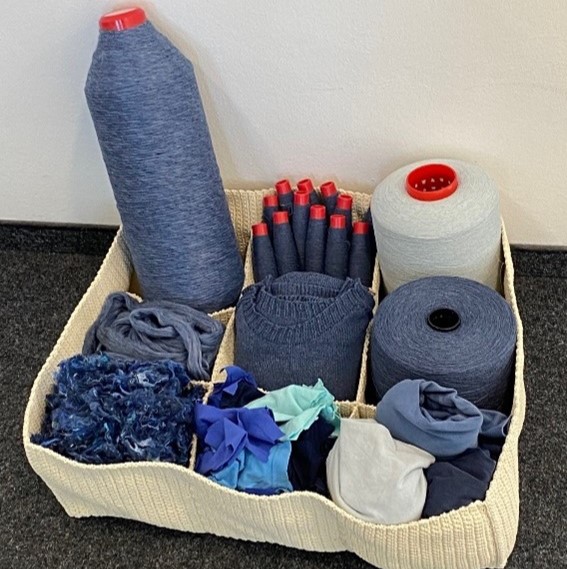Range of Services
1. Project Work
Full Day or 2 Days Inspirational Innovation Workshop
Creative Thinking Techniques

Feasibility Study
The feasibility study examines the solution approach for a pre- or post-consumer residue with regard to possible usability and feasibility.
Solution approaches are analyzed, risks identified and chances of success assessed.
Review of the solution approach considered with regard to agreed project results (processes, products) can be created under the given framework conditions. First sampling if possible
Proof of Concept / Proof of Principle
Within the proof of concept, an industrial amount of material is fed into the recycling process and processed into the product.
The process is mapped and evaluated in an industrial process chain with partners.
On request a LCA will be conducted.
Product Development incl. Marketing Story
Development of a new recycled product for the market.
Product development after Proof of Concept.
Determine customer requirements for the new product.
In product development, the task is to identify optimized solutions (technology, process parameters, economic efficiency).
The product development includes the marketing story.
Cost-Benefit Analysis in the Creation of a Business Case
Development of a new recycled product for the market.
Product development after Proof of Concept.
Determine customer requirements for the new product.
In product development, the task is to identify optimized solutions (technology, process parameters, economic efficiency).
The product development includes the marketing story.
Sustainability Assessment (supported by TÜV SÜD, Germany)
The textile industry is facing enormous challenges: Rising energy prices, shortages of raw materials, further reduction of environmental pollution and new regulatory requirements are among the main drivers behind the sector’s interest in pursuing sustainable and resource-saving production. The ITA International Centre for Sustainable Textiles (ITA Institut für Textiltechnik) offers comprehensive expertise on sustainability along the textile value chain. The critical step is to make sustainability “measurable” or “quantifiable”. To this end, TÜV SÜD Industrie Service GmbH has developed an assessment method which provides companies with a tried-and-tested tool for efficient and quantifiable sustainability management. The method is based on the United Nations’ Sustainable Development Goals (SDGs).
ITA Technologietransfer GmbH works with TÜV SÜD Industrie Service to offer joint sustainability assessments that supply players in the textile industry with objective measurability and quantification of their corporate sustainability.
The results of the assessment can then be used to establish a dedicated sustainability management system. When the SDGs are applied in combination with industry-specific weighting (materiality analysis) and specific indicators (risk analysis), the multi-faceted topic of “sustainability” – which is sometimes hard to pin down – becomes quantifiable. By doing this, the experts can identify the areas in which companies are facing high risks – for example, where the weighting is high and the degree of compliance low. With this information, companies can thus take targeted measures and minimise risks. The sustainability assessment by ITA and TÜV SÜD includes recommended actions.
In many cases, the assessment results and the actions derived therefrom even bring financial benefits. One example: Where findings such as “high water consumption due to previously unidentified causes (such as evaporation without recovery, leakage, overflowing)” are identified as weaknesses, actions such as leak tests or process optimisation may yield savings that are directly measurable and can be implemented at low cost. This enables companies to reduce their sustainability risks, make full use of opportunities for improvement and cost savings and improve transparency in their companies.
TÜV SÜD Industrie Service GmbH
https://www.tuvsud.com/en/services/auditing-and-system-certification/sustainability-assessment
2. Partnership at the Recycling Atelier
The partners of the Recycling Atelier support the conception, establishment and further development of the Recycling Atelier in cooperation with other parties at the Augsburg location with regard to a later implementation and industrialisation of the developed concepts. In return for the project contributions to be made by the partner, this partner is to be given the opportunity to be able to implement the industrial realisation of the Recycling Atelier concepts in the area of its product portfolio in coordination with the other project partners.
The Recycling Atelier has been in existence since June 2022 and is to be continuously used and further developed jointly by the parties over a period of at least five years.
3. Teaching and Research
Training Courses
„Sustainability and Textile Technology“
You will gain a basic understanding of sustainability in the textile industry and get an overview of the current state of the art. The seminar facilitates the evaluation of recycling opportunities, provides technical vocabulary, and gives inspiration for sustainability in your company.
Flyer 2023 Training offers Textile Sustainability ITA Academy
1-day training by scientists from the Institute of Textile Technology at RWTH Aachen University
„Sustainability in Textile Supply Chain“
The seminar provides an overview of the topic of sustainability in the supply chains of the textile and clothing industry. In addition to the complex interrelationships and common technical terms, current laws and voluntary seals are explained. The aspects are clearly demonstrated along the entire textile value chain and made tangible in an interactive workshop.
Flyer 2023 Supply Chain and LCA Trainings ITA Academy
2-day training with theoretical and practical phases including workshop and machine demonstrations in the technical centre of the Institute of Textile Technology at RWTH Aachen University.
Demonstration of a Recycling Loop with different Materials
Sampling package including process descriptionSet of demonstrators from used garments to a new textile product
(Examples of used garments, torn fibres, sliver, roving, cops, bobbin, sweater)
